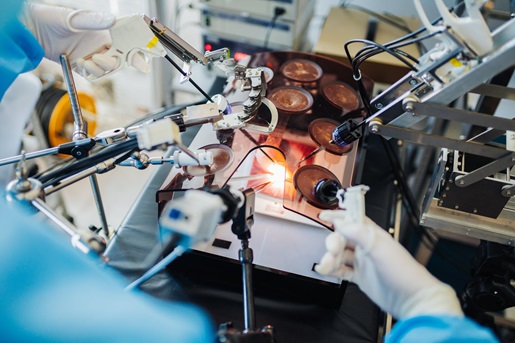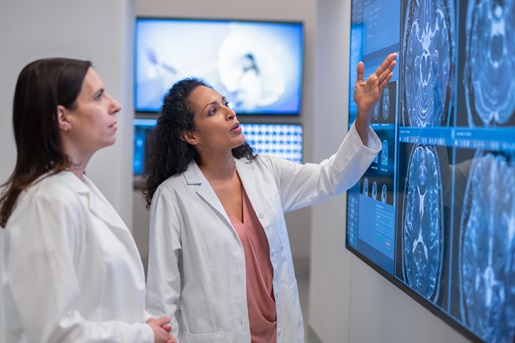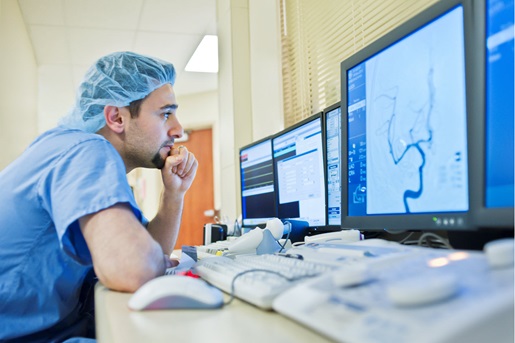From improving data quality to accelerating diagnostics, these pioneers are pushing the field forward
Like a lot of industries, healthcare faces severe resource shortages. U.S. physician burnout rates spiked to 63% in 2021, and budgets are spread thin. But there are reasons for hope, and AI solutions in healthcare are one of them. Companies around the world are working on ways for artificial intelligence to help providers do more with less. They’re improving clerical efficiency. They’re empowering patients. And they’re accelerating diagnoses.
There are countless organizations pushing AI forward. Here are just a handful of AI in healthcare companies doing exceptional work for the benefit of the entire sector.
Need help picking the right scanner for your transition to AI-powered healthcare? Check out our post, AI in Healthcare: The Complete Guide.
Leading providers of AI solutions in healthcare
1. 4Quant
The Swiss research university ETH Zurich has spawned a number of tech companies doing valuable work. 4Quant Ltd., founded in 2015, follows in that line. Its founders realized that one of the main challenges for AI solutions in healthcare was the lack of appropriate data to use as a learning model. The data existed, but it couldn’t be used. Why? For several reasons. It used different formats. It was rarely aggregated, synthesized, or enriched. And anonymizing it was a huge pain point. The industry needed a way to process this information before it could be used at scale.
This led 4Quant to create its HICCAP Annotation platform. By integrating with existing picture archiving and communication systems (PACS) and radiological information systems (RIS), the platform made the lives of providers much easier. Data they recorded and annotated would automatically be made accessible, interoperable, and reusable. There was no more worrying about whether their colleagues could find or use the work they had done. Data in hand, providers could refer to it during diagnosis. That improved their accuracy, increased their work speed, and raised the standard of care.
Of course, creating the data set (which clocks in at several petabytes) was just part of the challenge. 4Quant also created a Big Image Data Analytics Platform (BIDAP) to make working with the data faster and easier for providers.
2. NuMedii
Molecular biologist Gini Desphande founded NuMedii in 2008 in San Mateo, California. Desphande remains the company’s CEO and has guided it on its mission to discover new drugs, new targets for existing drugs, and new biomarkers.
AI is a cornerstone of NuMedii’s work. The organization designed its Artificial Intelligence for Drug Discovery (AIDD) technology to discover new connections between drugs and diseases. Using machine learning and cutting-edge deep learning, it sifts through the trillions of data points in NuMedii’s dataset for connections. That lets it accelerate new treatment discovery and save on research and development.
AIDD also helps derive more precise treatments. NuMedii estimates that 90% of conventional and blockbuster medicines work for less than half of patients. The company says side effects from those medications account for nearly a third of acute hospital admissions. To lower those rates, AIDD closely monitors the small differences in individual patients. From there, it identifies subsets of patients that respond better to specific treatments or combinations of treatments. That can lead to better patient outcomes. It also helps cull unlikely drug development paths, which speeds up go-to-market times for treatment.
Did You Know?:TMC named the RICOH fi-8170 as a Future of Work Product of the Year. TMC recognizes "companies that showcase the most innovative and disruptive products and solutions that have positively supported hybrid work experiences across the globe." Click here to learn more.
3. SkinVision
All cancer treatment benefits from early detection. But skin cancer can be particularly dangerous if caught too late. SkinVision aims to bring early detection to the masses with an easy-to-use mobile app. From the comfort of their home, users can take photos with their smartphones of any marks on their skin. They can then track any changes to those marks over time. As they do, the app identifies their skin type and builds a risk profile. Based on that profile, it can provide personalized advice that helps patients get the care they need.
Using a baseline set of images pre-examined by dermatologists, the app’s algorithm examines each patient’s photos for potential dangers. It then flags any that may be cause for concern, empowering patients to seek treatment promptly. Although the app can’t provide a diagnosis, it can flag aberrations that could require a doctor’s attention. A dermatologist then reviews its flags before passing them along to patients. Best of all, the algorithm improves over time as more and more patients upload their photos.
4. Ezra
Ezra also hopes to democratize cancer screenings. But its mission is more expansive than SkinVision’s. When it launched in 2019, it offered full-body magnetic resonance imaging (MRI) scans. These scans checked for more than 500 conditions — with a focus on cancer — in up to 13 organs.
But Ezra’s scans have an AI twist. Full-body MRI scans typically take more than an hour to complete. Ezra Flash speeds things up by using AI to enhance the quality of its scans. Ezra trained its AI on hundreds of thousands of images. A team of five radiologists then refined the model. The result: High-quality scans in a fraction of the time. This allows Ezra to charge less for its scans. That makes them more accessible, which lets more people catch diseases early.
AI solutions in healthcare often focus on diagnosis and data analysis. But Ezra also uses a technology called Reporter AI. This bot converts complex radiology reports into simple, consumer-friendly language. That makes it easier for providers to communicate results to their patients, saving time and improving care quality.
5. Enlitic
Like 4Quant, Enlitic(™) recognized that AI solutions in healthcare would never reach their full potential without a strong base of data. Rather than struggle with diagnostic tools built on bad data, Enlitic pivoted. The company now focuses on standardizing and anonymizing medical data.
One of its solutions is ENDEX AI. This bot transforms medical imaging data into consistent, standard clinical nomenclature. It pulls relevant information from the images and formats it for easier and faster use. In the process, it can correct broken reading protocols and accelerate reporting. Plus, it can make image orchestration and study routing more reliable while improving billing accuracy. The bottom line: Providers can find what they need that much faster, boosting operational efficiency.
Enlitic also created ENCOG, which anonymizes clinical data. It uses computer vision and Natural Language Processing (NLP) to separate protected health information (PHI) from relevant clinical info. It then scrubs PHI from all metadata, pixel data, and tags. That turns MR, computed tomography (CT), x-ray, and ultrasound scans into usable data.
Did You Know?:The fi-8170 can scan up to 70 pages per minute and 10,000 pages per day with crystal clarity. Click here to learn more.
Our recommendation: fi-8170
As many of these companies know, the digitization of high-quality data is the key to success for all AI solutions in healthcare. We take great pride in having spent the last 50+ years researching, designing, and developing some of the most advanced and powerful electronics in the world, including our professional grade fi and SP series of scanners.
Built to purpose for the most demanding document handling jobs, fi and SP scanners are capable of processing tens of thousands of pages per day at the highest levels of accuracy. Their intuitive integration capabilities with all existing work suites minimize time-to-value for businesses looking to invest in tools that will pay dividends for years to come.
If you’re looking to capture top-shelf data from documents, look no further than the fi-8170. This high-powered scanner captures scans at a rate of 70 double-sided pages per minute, and its scans are so clear that AI bots can easily identify text and images to pull data from. Plus, the fi-8170 uses an AI function called optical character recognition (OCR) that transforms your scans into workable text documents. Click here to learn more or shop the rest of our production scanner line.
Note: Information and external links are provided for your convenience and for educational purposes only, and shall not be construed, or relied upon, as legal or financial advice. PFU America, Inc. makes no representations about the contents, features, or specifications on such third-party sites, software, and/or offerings (collectively “Third-Party Offerings”) and shall not be responsible for any loss or damage that may arise from your use of such Third-Party Offerings. Please consult with a licensed professional regarding your specific situation as regulations may be subject to change.









